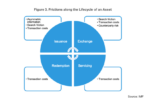Last month the Bank for International Settlements (BIS) Innovation Hub unveiled Project Agorá, its ambitious project with seven central banks to transform cross border payments with tokenization. It proposes using a Unified Ledger involving wholesale central bank digital currencies (wCBDC) and tokenized deposits on a shared infrastructure to execute payments. Today the BIS released a short paper on “Next generation correspondent banking“, which outlines the vision for Agorá. A large part of that relates to how compliance is dealt with.
Active correspondent banks have declined over the years, particularly in emerging markets. Often that’s the result of ever more stringent compliance requirements, which involve added expense. Hence, the withdrawals are often from regions where the cost and benefit trade offs don’t make sense for banks.
If the compliance process can be revisited and streamlined, perhaps that can arrest the decline in the number of correspondent banks.
The BIS has previously explained that Agorá doesn’t aim to disrupt the status quo in terms of participants. Hence, it aims to retain the correspondent banking system structure. Instead, it wants to explore changing the infrastructure by replacing messaging with tokenization and a Unified Ledger.
Today, payments are driven by messages that give banks instructions on how to credit particular clients. This separates the payment communication from money movement, whereas tokenization would merge these aspects. Messaging also results in the various banks involved in a payment updating their ledgers at different times. With tokenization there would be atomic settlement, so a payment is simultaneously reflected in the balances at each bank. And finally the know-your-customer (KYC) and anti money laundering (AML) compliance processes would be streamlined.
Proposed changes to KYC and AML
Currently, each bank in a payment chain has to perform its own AML and compliance procedures, which frequently cause holdups. Project Agorá aims to prescreen payments so they are done once.
The BIS Project Mandala is experimenting with a shared protocol that checks for compliance with jurisdiction specific requirements, such as restrictions on capital movements in addition to sanctions and AML. The protocol then provides a ‘proof of compliance’ for the payment.
Separately, the BIS is proposing using artificial intelligence (AI) to build models for AML and transaction monitoring. To train the AI, this involves sharing data across institutions in a privacy preserving manner. Potentially this could be done centrally or alternatively in a federated learning manner. The latter usually involves an algorithm working on a single bank’s data and communicating a summarized result without sharing the underlying data.
The paper concludes, “Next generation correspondent banking should be inclusive, accessible and capture beneficial network effects.”






